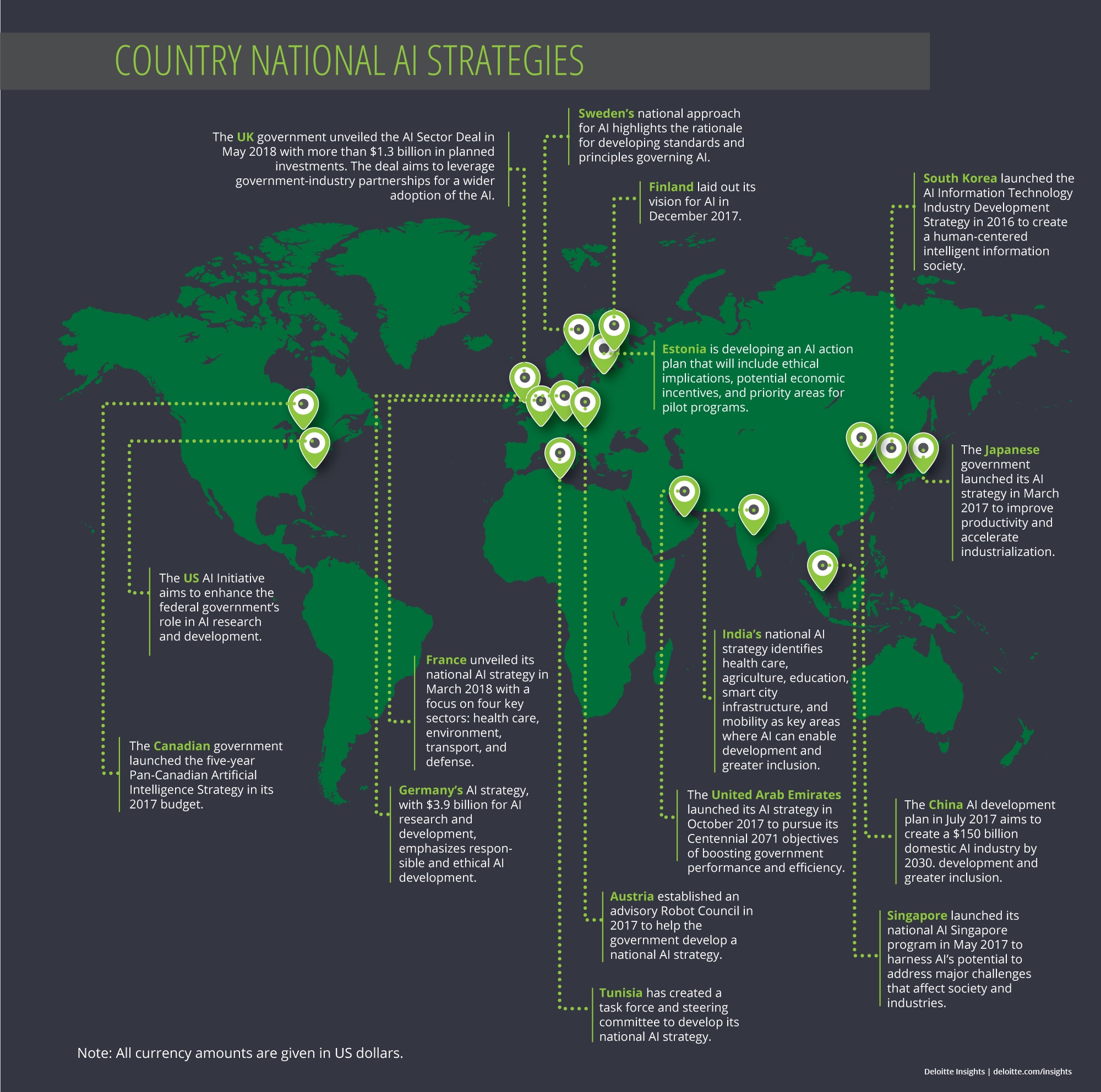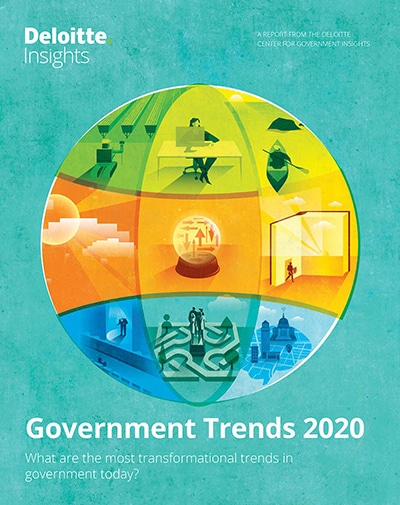
AI-augmented government Climbing the AI maturity curve
6 minute read
24 June 2019
The growing toolkit of artificial intelligence—from computer vision to machine learning—has the potential to enhance almost everything government does, spanning education, health care, and defense.
Artificial intelligence (AI) is not a new technology.1 Computers in the past, however, were mostly limited to performing routine processing on structured inputs. Today, AI can perform wildly complex tasks—from driving a car to playing chess to grading essays—at a level often equal to or surpassing the most talented humans, while performing these tasks at scale. AI can also work with humans to produce value in unprecedented ways.
The growing toolkit of AI—computer vision, natural conversation, and machines that learn over time—has the potential to enhance almost everything government does, from education and health care to policing and defense. Until recently, many governments struggled to understand what AI could accomplish; today, more than 80 percent of early adopter public sector organizations we surveyed are using or planning to use AI, and nearly 90 percent consider cognitive technologies to be of extreme strategic importance for their internal business processes.2 And AI is just at the beginning of the adoption curve.
One reason AI can work well for government is that it needs volumes of data—and governments have plenty of volume. Already, the US federal government has digitized more than 235 million pages of government records, and it plans to reach 500 million pages by fiscal year 2024.3 Imagine the value of intelligent machines processing this vast trove of data. As the connected sensors on the Internet of Things produce ever-more data, and as cloud computing makes data-sharing easier, AI should make it possible to tackle more ambitious problems in various industries:4
- Health care. The United Kingdom’s National Health Service is using AI-driven chatbots to assist patients with non-life-threatening conditions. This frees doctors’ time to focus on patients who actually need emergency care.5 In Japan, the government is planning to invest US$100 million to build 10 “smart” hospitals to address the shortage of medical professionals. The hospitals will use AI to analyze medical test results and recommend appropriate treatments.6
- Transportation. Pittsburgh has installed AI-enabled traffic lighting, which has helped cut travel times by 25 percent and idling times by 40 percent.7 Singapore is using AI and data analytics for its intelligent transportation system to reduce traffic congestion and improve the punctuality of its public transport.8
- Human services. Australia’s Department of Human Services (DHS) deploys an internal chatbot called Roxy that uses AI to answer queries from case-processing officers. The chatbot can answer about 85 percent of the questions asked by case-processing officers, thus reducing the DHS staff’s workload.9 In the Netherlands, a government agency has used machine learning to detect fraud and waste in its social benefit programs.10
- Law enforcement. The city of Chicago is attempting to prevent violent crimes before they happen. The city’s predictive analytics unit runs spatial algorithms on 911 call data to identify where and when violent crimes or robberies are most likely to happen.11
- Defense and national security. The United Kingdom’s Institute for Strategic Dialogue has developed a natural-language-based solution to monitor the internet for signs of radicalization. Of the total sample of 42,000 individuals identified online, nearly 800 were found to indicate signs of extremism.12 In South Korea, the armed services launched the AI Research and Development Center in January 2019. The center will comprise 50 military and civilian staff with knowledge of AI, big data, and other emerging technologies; they will collaborate with nongovernment partners to develop AI capabilities for military use.13

As these examples show, AI often augments human workers, relieving public employees from more mundane tasks to focus on the most important. AI-augmented government isn’t about replacing humans; it’s about taking advantage of the best capabilities of both humans and technology. The AI journey can be divided into three stages:14
- Assisted intelligence. Here, government organizations can harness the power of big data, cloud, and data science to aid decision-making.
- Augmented intelligence. In this stage, machine learning capabilities are layered over existing systems to augment human intelligence competencies.
- Autonomous intelligence. In the most advanced stage, processes are digitized and automated to deliver intelligence upon which machines, bots, and systems can act.
AI adoption in government isn’t without its challenges, which range from algorithmic bias to data privacy to funding. (Read more about bias, data privacy, and other issues in our other trend, “The rise of data and AI ethics.”) But AI’s power to multiply human productivity makes its continued growth in government seem inevitable.
Applied wisely, AI can be a national asset and a source of global competitive advantage. Numerous governments are investing in national AI strategies, involving both the public and private sectors:
- Germany has earmarked US$3.4 billion for AI in its national strategy released in 2018.15
- France is planning to spend US$1.8 billion.16
- South Korea has budgeted US$2 billion for AI research and development, with the goal of becoming one of the top four AI nations by 2022.17
- China, which has pledged to spend US$100 billion of tax revenues on AI, has the ambitious goal of developing a US$1 trillion AI industry by 2030.18
- Other nations such as Canada, Japan, Singapore, and India have also developed national AI strategies.19
With AI use in government rising significantly, there will be big implications for the government workforce. Workforce planning will need to consider the interplay between people, technologies such as bots and machine learning, and outside partners. Cognitive technologies may well prompt governments to reimagine the nature of government work itself, and redesign that work to make the most of both human and machine skills.
Data signals
- Around 1.3 billion hours can potentially be freed up through automation in the US federal government.20
- Approximately 44 percent is the estimated growth rate for AI spending in central governments around the world through 2022, faster than AI spending in personal and consumer services.21
- Eighty-four percent of US public sector executives cited data privacy and quality issues as the biggest challenges for AI adoption.22
- Sixty-eight percent of respondents in a Deloitte-NASACT survey indicated that their staff will be provided more training in cognitive technologies and automation to plug skills gaps.23
- More than 25 countries have launched national AI strategies.24
Moving forward
- Define the broad AI strategy and have clarity on purpose: Is the goal to reduce cost or add value or a combination of both approaches?
- Define the problems the agency faces and how and which AI technologies might best address them.
- Identify the right use cases to pilot and have a long-term plan to scale them.
- Build the AI talent capacity, both internally and externally, to execute on projects.
- Identify relevant data and determine its accessibility.
Potential benefits
- Augment human effort to create value at scale;
- Improve the quality of services;
- Reduce paperwork; and
- Catalyze economic development.
Risk factors
- Getting the government workforce ready for the AI era;
- The growing complexity of AI technologies;
- Funding AI technologies; and
- Growing concerns over algorithmic risk, black box, and bias.
Read more about AI-augmented government in the AI in government collection.
-
Nudging for good Article5 years ago
-
Citizen experience in government takes center stage Article5 years ago
-
Smart government Article5 years ago
-
The rise of data and AI ethics Article5 years ago
-
The digital citizen Article5 years ago
-
Government Trends 2024 Article5 months ago















